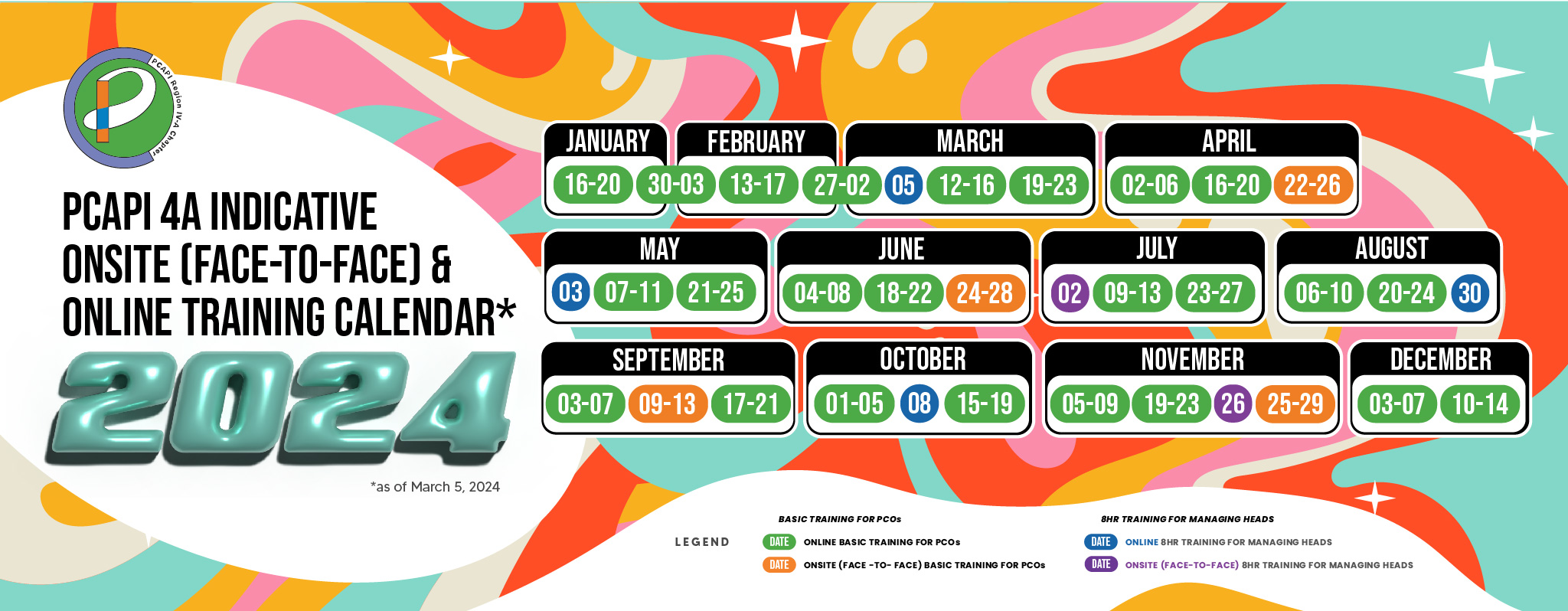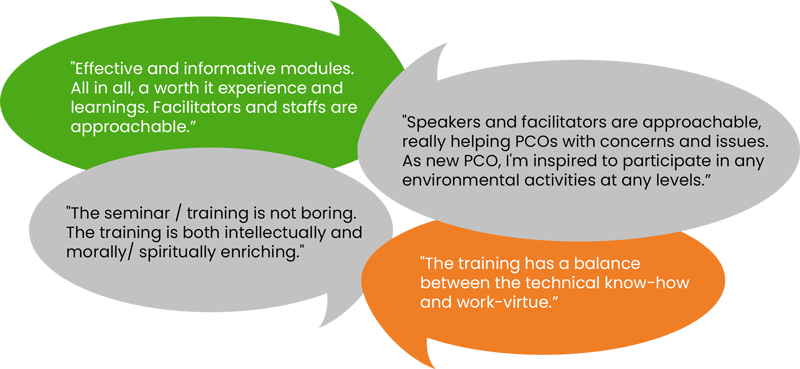
Welcome to PCAPI R4A’s
“Onsite / Face to Face Training
This Training aims to develop the capacity of Pollution Control Officers (PCOs) in performing their functions, duties and responsibilities using accelerated learning techniques based on actual experiences and best practices. Upon completion of the course, the designated PCO can apply for accreditation using the certificate of participation of this training. In this regard, we would like to invite your Company to send your designated PCO for accreditation with the EMB. Training fee shall be at the following rates:


INCLUDES NEW MODULES ADAPTED FROM EMB-PRESCRIBED SYLLABUS
BASIC ACCREDITATION TRAINING COURSE FOR POLLUTION CONTROL OFFICERS (PCOs)
This training aims to develop the capacity of Pollution Control Officers (PCOs) in performing their functions, duties and responsibilities using accelerated learning techniques based on actual experiences and best practices.
Specifically, at the end of the 40 hours training, the participant shall have:
• Have a deeper understanding and appreciation of the environmental situation and be able to relate the importance of compliance to environmental laws covered in this training.
• Have learned the salient features and gained insights on the Framework of Philippine Environmental Regulations and understood compliance requirements of its environmental laws (PD 1586, RA 9003, RA 9275, RA 8749, RA 6969).
• Identified the required and applicable permits/ clearances applicable to one’s operations.
• Be able to identify situations to avoid, that which could warrant violation actionable by the Pollution Adjudication Board (PAB)
• Learned the do’s and don’ts of environmental sampling on air, water and soil.
• Identified reportable environmental incidents, identified methods to use for environmental cases investigations, and practiced preparing an Incident report using EMB-prescribed form
• Understood the roles, functions and values of a PCO and identified the requirements for PCO Accreditation stated under DAO 2014-02.
• Gained knowledge and practiced preparing EMP/ EMoP.
• Gained knowledge and practiced preparing CMR and SMR
• Have gained insights from best practices of PCOs and related allied-industries in the field of environmental management and pollution control.
CRITERIA FOR CATEGORIZATION OF ESTABLISHMENTS
| CRITERIA | CATEGORY A | CATEGORY B |
|---|---|---|
| Chemical Usage, Storage, and/or Handling | Using, storing, and/or handling chemicals which are not listed in Annex 1 of this Order | Using, storing, and/or handling chemicals which are listed in Annex 1 of this Order regardless of quantity |
| Hazardous Waste Generated | Small quantity generators as defined in Annex 2 of this Order | • Large quantity generators as defined in Annex 2 of this Order • Accredited Transporter; or • Accredited Treatment, Storage, and Disposal (TSD) Facility |
| Air Emissions | • Boilers <50 HP • Diesel generators < 300 kW • APSE <10 tons/yr of an air pollutant regulated under RA 8749, or establishments not required to undergo stack sampling |
• Small, medium, large-sized, or environmentally significant existing source as defined in EMB MC 2007-003; or • Establishments required to undergo stack sampling |
| Solid Waste Generated | Generates more than 30 kg/day of aggregate solid waste | • Centralized MRF; or • Solid waste treatment or processing facilities; or • Sanitary Landfill or with sanitary landfill |
| Water Discharge | < 30 m3/day and with effluent quality parameters not listed in Annex 3 if this quarter | • > 30m3/day; or • With effluent quality parameters listed in Annex 3 of this Order; or • Classified as Strong Wastewater (with influent BOD ≥ 3,000mg/L); or • Transporter or treater of wastewater, sewage and/or septage |
| Sludge Generated | n/a | Transporter or treater of sludge |
QUALIFICATION REQUIREMENTS for pcos FOR PCOs
| CRITERIA | CATEGORY A | CATEGORY B |
|---|---|---|
| BASIC QUALIFICATIONS | • Filipino citizen, of legal age, with good moral character, and mentally and physically healthy • Full time employee of the establishment where he/she is being appointed/designated as PCO • Has completed the basic PCO training course by an EMB-recognized training organization/ institution within the last three (3) years |
• Filipino citizen, of legal age, with good moral character, and mentally and physically healthy • Full time employee of the establishment where he/she is being appointed/designated as PCO • Has completed the basic PCO training course by an EMB-recognized training organization/ institution within the last three (3) years |
| MINIMUM COMPETENCY REQUIREMENTS (Any of the following) | • Graduate of any related technical course • Had reached third year in tertiary level education • Had been with the establishment for at least three (3) years in a supervisory position or in a responsible position or equivalent experience • A store manager, retail station manager, or building administrator of, but not limited to, fast-food stores, gasoline stations, and condominiums may be designated as PCO provided he/she possesses the minimum competency requirements • Owner/manager REGARDLESS of professional qualification may be designated as PCO for Category A establishments provided he/she possesses the Basic Requirements |
• Licensed engineers/chemists with at least two (2) years relevant experience in environmental management • Professionals in the field of engineering or physical and natural sciences with at least three (3) years relevant experience in environmental management • Other professionals of appropriate discipline with at least five (5) years relevant experience in environmental management |
Who can be the Managing Head (MH) of the establishment?
Maybe any of the following:
• CEO / President / GM
• Highest Filipino ranking officer
• Internally determined by the Management
• Ideally has supervisory functions over the work of the PCO
NOT ALL TRAININGS ARE CREATED EQUAL
WHY TRAIN WITH PCAPI 4A? “The Gold Standard in PCO Training”
Accredited Training Institution by EMB since 2014.
Recipient, Outstanding Training Institution (EMB 4A)
Hall of Fame Awardee, Best PCAPI Chapter by PCAPI National Chapter
Organizational Member of International Society of Sustainability Professionals, 2019
Most trusted training provider by domestic and multinational companies in the Philippines
Membership-based NGO. We exist to serve our co-PCOs and create a community of PCOs driven with excellence and integrity.

POWERFUL. COMPLETE. EFFECTIVE


Registration and Payment
- Registration starts at 8am on Day 1.
- Make sure to bring your payment with you (we only accept cash or cheque).
- For deposited payments, email a copy of the deposit slip to us. Please make sure that we
acknowledge your email. If you do not receive a reply from us, it only means that we’re not able to
receive your proof of payment. You can also bring a copy of the deposit slip and present upon
registration on Day 1. - If you cannot settle the payment on Day 1, inform us now and we will guide you on our to-followpayment-
process.
Attire
- Please be in your smart casual attire. We do not allow wearing of sando, shorts, slippers and other
inappropriate clothes during the training. - Venue might be too cold for you, so bring clothes that will make you feel comfortable.
- For live-in participants, you may bring extra clothes or swimming attires as you can freely use the
resort’s amenities. Towels and basic toiletries will be provided by the hotel. Room slippers are not
included.
Cellphone, Laptop and Wifi
- We are sorry to say that we will not provide wifi connection during the training. If you need
internet connection, you may bring your own. - Use of cellphones and laptop for other purposes aside for the training is highly discouraged.
Attendance
-
- Sign the attendance sheet everyday. Make sure that all your details in the attendance sheet are
correct. It will be the basis for the printing of your certificate. - Should you have an emergency and need to leave the training, coordinate with the facilitator
before leaving. We have a waiver form that you need to sign. - Please note that when you missed a topic and therefore was not able to complete the 40-hour
training requirement, we hold your certificate. You need to attend the next training for a make-up
- Sign the attendance sheet everyday. Make sure that all your details in the attendance sheet are
class of the missed topic and only then shall we release your Certificate of Completion.
Evaluation
- Kindly fill up our evaluation form that is included in the training kit that we will provide to you.
This is very important to us as this guides us in the continuous improvement of our training
services. - At the end of the training, we will collect this from you in exchange of your certificate.
Questions - We encourage you to actively participate during the discussions specially in the Q and A portion.
Don’t be afraid to speak up and share your ideas but at the same time respect the opinions of
others.
CLAYGO
Practice clean as you go always.
This course offering is in line with the 40-hour training requirement for the Pollution Control Officer Accreditation of designated PCOs, as stipulated in the DENR Administrative Order (DAO) 2014-02 (Revised PCO Accreditation Guidelines).
This training aims to impart to participating Managing Heads of PCOs to Comply with the training requirement of DENR-DAO 2014-02 for Managing Heads and
Understand the highlights and salient points of relevant environmental regulations
TLC: The Learning Curve Series
(Non-Accredited On-line Courses for PCOs)
The effectiveness of the work of the PCO is gained through experience. Accelerate that capacity building by attending any of the TLC Courses!

About Us
PCAPI Region IV-A Chapter is an association of Pollution Control Officers organized in 1997 whose vision is “to be the leading association of Pollution Control Officers (PCOs) and environmental practitioners and be an internationally-recognized training institution, empowering its stakeholders in the protection of the environment.”
The Association serves its members by promoting environmental responsibility through training modules for Pollution Control Officers (PCOs) and members from basic to advance training; developing technical expertise, management skills, familiarity with all sides of environmental issues and networking to other environmental expertise.
